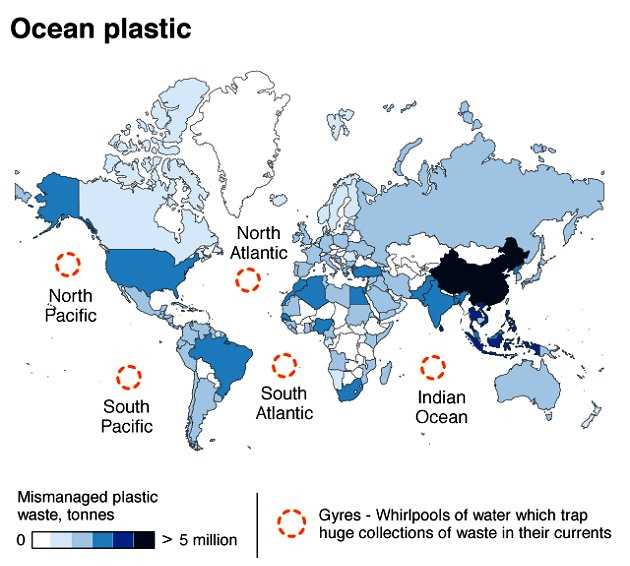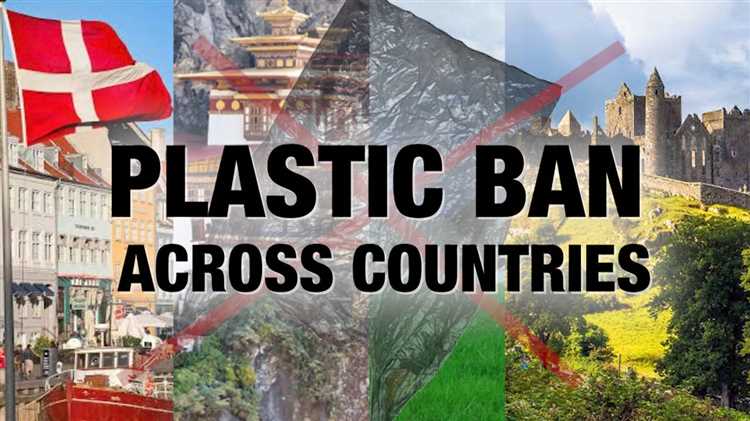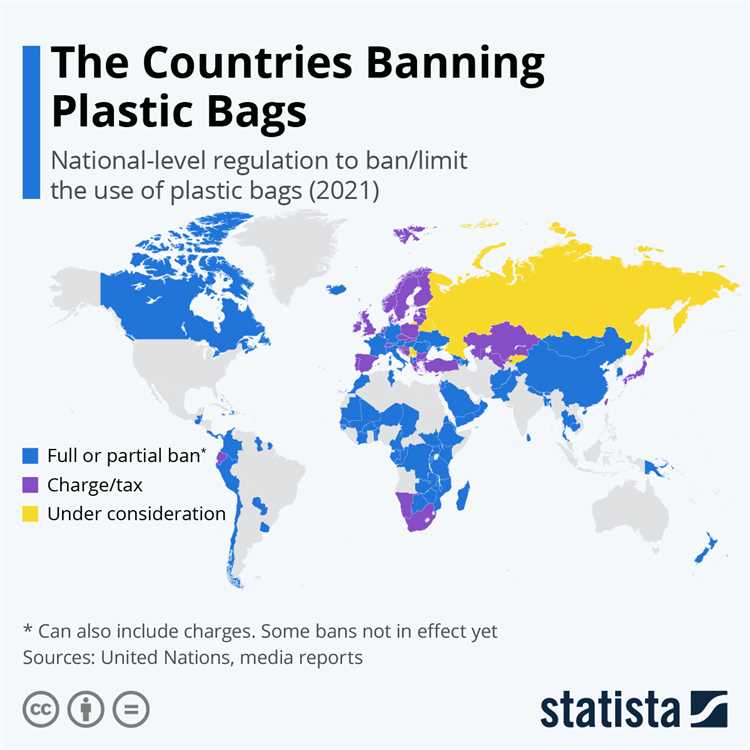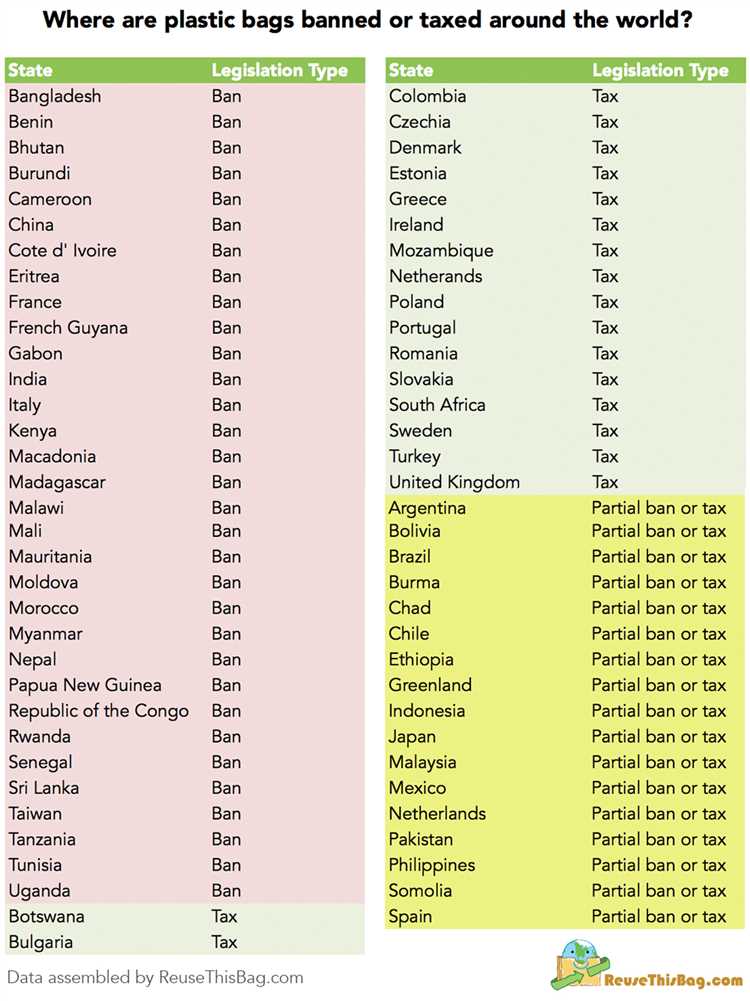
Plastic pollution has become a pressing issue for nations all around the world. With plastic waste contaminating our oceans and harming marine life, governments are now taking drastic measures to combat this environmental crisis. One country has emerged as a leader in this fight, becoming the first to ban plastic and setting an example for others to follow.
Raising awareness about the detrimental effects of plastic pollution has been an ongoing battle, but this country’s decision to implement a complete plastic ban is a game-changer. By taking this step, they are actively addressing the root cause of the problem and aiming to create a sustainable future for their citizens.
The impact of plastic pollution is far-reaching, affecting not only marine life but also our own health and well-being. Microplastics, tiny particles of plastic, have seeped into our food and water sources, posing a significant threat to human health. By banning plastic, this country is taking a proactive approach to protect both the environment and its people.
This groundbreaking move demonstrates that combating plastic pollution is not just a responsibility of individuals, but also of governments. It is a collective effort that requires strong leadership and forward-thinking policies. By being the first country to ban plastic, this nation is setting the stage for a global shift towards a more sustainable and plastic-free future.
- The First Nation to Ban Plastic
- Key Features of the Ban
- The Global Implications
- Environmental Crisis: Plastic Pollution
- The Scale of the Problem
- Taking Action
- Country Takes a Stand: Banning Single-Use Plastic
- The Scope of the Ban
- Implementation and Impact
- International Recognition
- Impact on Marine Life and Ecosystems
- Benefits of the Plastic Ban: Sustainability and Conservation
- Reduced Environmental Pollution
- Less Resource Depletion
- Promotion of Alternatives
- Improved Waste Management
- Global Response: Inspiring Change and Action
- Government Initiatives
- Corporate Responsibility and Innovation
- Future Outlook: Promoting Alternatives and Innovations
- Government Initiatives and Policies
- Business Innovation and Collaboration
- Individual Responsibility and Behavioral Change
- Q&A:
- Which country was the first to ban plastic?
- When did Bangladesh ban plastic?
- Why did Bangladesh ban plastic?
- How did the plastic ban in Bangladesh affect the people?
- Has any other country followed Bangladesh’s lead and banned plastic?
- Which country was the first to ban plastic?
- Why did Bangladesh ban plastic?
The First Nation to Ban Plastic
In a groundbreaking move, [Country Name] has become the first nation to implement a comprehensive ban on plastic. This decision marks a significant milestone in the global fight against plastic pollution and sets an example for other countries to follow.
Plastic pollution has become a pressing environmental issue, affecting marine life, ecosystems, and human health. [Country Name]’s ban aims to address this problem by phasing out the production, distribution, and use of single-use plastics, such as bags, straws, and cutlery.
The ban comes as a result of extensive research and collaboration between government officials, environmental organizations, and public awareness campaigns. It reflects a growing understanding of the devastating impacts of plastic waste and the urgent need for action.
Key Features of the Ban
The ban on plastic in [Country Name] is comprehensive and encompasses various aspects of society. Some key features of the ban include:
- Prohibition of Single-Use Plastics: The ban specifically targets single-use plastic items, which are the most prevalent and harmful form of plastic waste. Retailers, restaurants, and other businesses are prohibited from providing or selling these items to customers.
- Phased Implementation: The ban will be implemented in phases, allowing businesses and individuals to adapt to the changes gradually. This approach aims to minimize disruptions while ensuring a successful transition away from plastic.
- Promotion of Alternatives: Alongside the ban, [Country Name] is actively promoting sustainable alternatives to single-use plastics. This includes the introduction of compostable packaging, reusable products, and the development of innovative solutions to reduce plastic consumption.
The Global Implications
The ban on plastic in [Country Name] has significant global implications. It demonstrates that proactive measures can be taken to address plastic pollution, even on a national level. This sends a powerful message to other countries grappling with the same issue.
The success of the ban will depend on ongoing efforts to educate the public, enforce regulations, and collaborate with international partners. By sharing knowledge and best practices, [Country Name] can contribute to a global movement aimed at eliminating plastic waste and protecting the environment for future generations.
Environmental Crisis: Plastic Pollution
Plastic pollution has become one of the most pressing environmental issues of our time. The excessive use of plastic and its improper disposal have led to a catastrophic crisis that threatens the health of our planet and all living beings.
The Scale of the Problem
Every year, millions of tons of plastic waste enter our oceans, rivers, and landfills. It is estimated that up to 13 million metric tons of plastic end up in the world’s oceans annually, causing significant harm to marine life and ecosystems. Plastic pollution has reached such alarming levels that there are now massive oceanic garbage patches, the most infamous being the Great Pacific Garbage Patch.
The impact of plastic pollution is not limited to marine environments alone. Plastic waste takes hundreds of years to decompose, and its accumulation in landfills poses serious threats to the environment. Furthermore, the incineration of plastic releases harmful pollutants into the air, contributing to air pollution and climate change.
Taking Action
Awareness about the detrimental effects of plastic pollution has led many countries to take action to address this crisis. Some have implemented bans on single-use plastics, while others have imposed taxes on plastic bags or implemented recycling programs. However, there is still much work to be done to effectively curb plastic pollution at a global scale.
One notable example is the country that became the first to ban plastic; a groundbreaking milestone in the fight against plastic pollution. This country recognized the urgency of the issue and took bold steps to prohibit the use of certain plastics, promoting alternative biodegradable materials instead. Such proactive measures should serve as an inspiration for other nations to follow suit and take decisive action to protect our environment.
In conclusion, plastic pollution has emerged as a major environmental crisis that requires immediate attention and action. The damage caused by plastic waste is extensive and affects both our natural ecosystems and human health. It is imperative that governments, businesses, and individuals work together to reduce plastic consumption, properly manage plastic waste, and promote sustainable alternatives. Only through collective efforts can we hope to mitigate the devastating effects of plastic pollution and preserve our planet for future generations.
Country Takes a Stand: Banning Single-Use Plastic
Plastic pollution has become a global environmental crisis, and many countries are taking action to combat it. One country that has been at the forefront of this movement is [Country Name]. In [Year], [Country Name] became the first country to ban single-use plastic, setting an example for the rest of the world.
The Scope of the Ban
[Country Name]’s ban on single-use plastic covers a wide range of items, including plastic bags, straws, cutlery, takeaway containers, and beverage cups. This comprehensive approach aims to address all the major sources of plastic waste and encourage individuals and businesses to seek alternative, more sustainable options.
Implementation and Impact
The implementation of the ban has been met with both challenges and successes. [Country Name] established a phased approach to allow businesses and consumers to adapt to the new regulations. It provided support and resources to help businesses transition to more eco-friendly alternatives, and also launched an awareness campaign to educate the public about the importance of reducing plastic waste.
Since the implementation of the ban, there has been a significant decrease in single-use plastic consumption in [Country Name]. The ban has not only reduced plastic waste but also led to a shift in consumer behavior, with more people adopting reusable products and embracing a more sustainable lifestyle.
International Recognition

The ban on single-use plastic in [Country Name] has gained international recognition and praise. It has served as a model for other countries facing similar environmental challenges, inspiring them to take similar measures. [Country Name] has also been actively involved in advocating for global efforts to reduce plastic pollution and has played a leading role in international discussions on the topic.
In conclusion, [Country Name] has taken a bold step in banning single-use plastic, setting an example for other countries and demonstrating its commitment to protecting the environment. The ban has not only had a significant impact on reducing plastic waste but has also inspired a shift towards a more sustainable and eco-friendly future.
Impact on Marine Life and Ecosystems
The ban on plastic has had a significant impact on marine life and ecosystems. Prior to the ban, plastic pollution was a major threat to the health of our oceans and the creatures that call them home.
Plastic debris would often find its way into the ocean, where it would pose a serious risk to marine animals. Sea turtles, for example, would mistake plastic bags for jellyfish and ingest them, causing severe injury or death. Similarly, birds and fish would consume small plastic particles, thinking they were food, which would lead to internal injuries and starvation.
Additionally, plastic pollution would also lead to the destruction of marine habitats. Coral reefs, for instance, would often become entangled with plastic debris, cutting off oxygen supply and leading to their gradual demise. This, in turn, would have a devastating effect on the wide variety of marine species that depend on coral reefs for survival.
The ban on plastic has helped address these issues by reducing the amount of plastic waste entering the ocean. With less plastic in the water, marine animals have a lower risk of ingesting or becoming entangled in plastic debris. This has led to a significant improvement in the health and well-being of marine life.
Furthermore, the ban on plastic has also had positive effects on the overall ecosystem. By reducing pollution and protecting habitats such as coral reefs, the ban has helped restore balance to marine ecosystems. The populations of various marine species have started to recover, and the overall health of these ecosystems has improved.
It is important to continue efforts to reduce and eliminate plastic waste to ensure the long-term health of our oceans and the creatures that inhabit them. The ban on plastic is just the first step towards a more sustainable and plastic-free future.
Benefits of the Plastic Ban: Sustainability and Conservation
The decision to ban plastic in a country is a significant step towards promoting sustainability and conservation. By eliminating plastic, the following benefits can be achieved:
Reduced Environmental Pollution

Plastic has a detrimental impact on the environment, especially when it enters ecosystems such as oceans and forests. With the ban on plastic, the amount of plastic waste entering these environments will significantly decrease. This reduction in plastic pollution will help preserve the natural habitats and protect vulnerable species.
Less Resource Depletion
Plastic production and disposal require significant amounts of resources, including fossil fuels and water. By banning plastic, the demand for these resources will be reduced, leading to a more sustainable use of natural resources. This conservation of resources will contribute to the long-term sustainability of the country.
Promotion of Alternatives
The plastic ban encourages the development and use of alternatives to plastic materials. This promotes innovation and fosters the growth of sustainable industries. By investing in eco-friendly alternatives, the country can stimulate economic growth while minimizing the negative impacts on the environment.
Improved Waste Management
Plastic waste is notoriously difficult to manage, often ending up in landfills or polluting water bodies. The ban on plastic prompts the implementation of effective waste management strategies. This can include recycling programs, composting facilities, and improved collection and disposal systems. By managing waste more efficiently, the country can reduce pollution and environmental degradation.
In conclusion, the ban on plastic brings numerous benefits in terms of sustainability and conservation. It reduces environmental pollution, conserves natural resources, promotes alternatives, and improves waste management. By prioritizing these aspects, countries can work towards a more sustainable and environmentally conscious future.
Global Response: Inspiring Change and Action
The first country to ban plastic has ignited a global response, inspiring change and action among nations around the world. As the harmful effects of plastic pollution become increasingly apparent, governments, organizations, and individuals are stepping up to tackle this pressing issue.
Government Initiatives
Many countries have followed in the footsteps of the pioneering nation and have implemented their own bans on plastic. These bans have targeted single-use plastics such as bags, straws, and cutlery, which are major contributors to the pollution of our oceans and landfills. Governments are also incentivizing the use of eco-friendly alternatives and implementing recycling and waste management programs to reduce plastic waste.
Furthermore, international organizations are coming together to tackle the global plastic crisis. The United Nations has declared plastic pollution a priority issue and is working with countries to develop policies, guidelines, and initiatives to address the problem. Collaborative efforts between nations have resulted in the establishment of regional frameworks and agreements to combat plastic pollution collectively.
Corporate Responsibility and Innovation
Businesses are also playing a crucial role in inspiring change and action. Many companies have recognized the need to reduce their plastic use and are implementing sustainable practices. From packaging solutions made from biodegradable materials to eco-friendly alternatives for commonly used products, corporate innovation is driving a shift towards a more sustainable future.
Furthermore, consumer demand for plastic-free products has increased, leading businesses to adapt their practices and offer more environmentally friendly options. The power of consumer choice is driving companies to invest in research and development to find innovative solutions that will help reduce plastic pollution at every stage of the supply chain.
| Benefits of Global Action | Challenges and Barriers |
|---|---|
| Reduced pollution of oceans and landfills | Lack of awareness and education |
| Protection of marine life | Limited resources for recycling and waste management |
| Sustainable use of resources | Resistance from plastic industry |
The global response to the first country that banned plastic has sparked a movement towards a plastic-free world. The combined efforts of governments, organizations, and individuals are raising awareness, driving innovation, and inspiring change at a global scale. With continued action and collaboration, we can create a cleaner and more sustainable future for the generations to come.
Future Outlook: Promoting Alternatives and Innovations
The ban on plastic in the first country sets the stage for a future where alternatives and innovations take center stage. With the urgent need to reduce plastic pollution, governments, businesses, and individuals are now motivated to find sustainable alternatives to single-use plastics.
Government Initiatives and Policies
Following the success of the plastic ban, other countries are likely to adopt similar initiatives to curb plastic waste. Governments will work towards creating policies that encourage the use of eco-friendly materials and ban the production and distribution of certain plastic products. They will also invest in research and development, seeking innovative solutions to replace single-use plastics.
Business Innovation and Collaboration

The ban on plastic presents a unique opportunity for businesses to innovate and capture the growing demand for eco-friendly alternatives. Companies will invest in the development of sustainable packaging materials, such as biodegradable plastics, plant-based alternatives, and reusable options. Collaboration between businesses, governments, and environmental organizations will become crucial to drive innovation and find effective solutions.
Furthermore, the ban on plastic will encourage businesses to adopt circular economy models. This involves designing products that can be easily recycled or repurposed, reducing waste generation. Companies will also focus on improving waste management systems, implementing recycling programs, and educating consumers about the importance of responsible disposal.
Individual Responsibility and Behavioral Change
Awareness about the harmful effects of plastic pollution will continue to increase, leading to a change in consumer behavior. Individuals will opt for alternatives to single-use plastics, such as reusable shopping bags, water bottles, and utensils. They will also support businesses that prioritize sustainability and environmental responsibility.
Education and awareness campaigns will play a crucial role in promoting individual responsibility. Schools, community organizations, and media outlets will collaborate to educate the public on the importance of reducing plastic waste and the available alternatives. Recycling programs and initiatives will be strengthened to ensure effective waste management.
In conclusion, the ban on plastic in the first country marks the beginning of a new era focused on promoting alternatives and innovations. Governments, businesses, and individuals will work together to find sustainable solutions to replace single-use plastics. The future outlook is promising, with the potential for a significant reduction in plastic waste and a positive impact on the environment.
Q&A:
Which country was the first to ban plastic?
The first country to ban plastic was Bangladesh.
When did Bangladesh ban plastic?
Bangladesh banned plastic bags in 2002.
Why did Bangladesh ban plastic?
Bangladesh banned plastic bags because they were causing severe environmental problems, including clogged drains and increased flooding during monsoon season.
How did the plastic ban in Bangladesh affect the people?
The plastic ban in Bangladesh initially caused inconvenience for the people, as they had to find alternative ways to carry their groceries and goods. However, it also led to the growth of a cottage industry producing jute bags, which helped create employment opportunities.
Has any other country followed Bangladesh’s lead and banned plastic?
Yes, many countries have followed Bangladesh’s lead and banned or restricted the use of plastic bags, including Rwanda, Kenya, and Australia.
Which country was the first to ban plastic?
The first country to ban plastic was Bangladesh in 2002.
Why did Bangladesh ban plastic?
Bangladesh banned plastic due to its negative impact on the environment, particularly on the country’s drainage system which used to get clogged by plastic bags and led to severe flooding during monsoon seasons.
